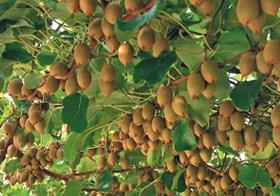
Kiwifruit growers in New Zealand have agreed to match the NZ$25m in taxpayer funds that has already been earmarked by the government for 'aggressive management' of the recent Psa bacterial outbreak in a number of orchards.
The agreement was reached following a series of grower meetings held in New Zealand over the past couple of days, during which the kiwifruit sector's Industry Advisory Council – representing around 1,500 individual growers – supported the package.
Reports suggested all but two of the country's growers gave their backing to the proposals.
John Loughlin, chairman of New Zealand kiwifruit marketer Zespri, commented: 'The New Zealand kiwifruit industry is a key export earner and significant new Zealand employer. I am confident that the government’s timely support and NZ$25m-dollar contribution to the Psa Management Strategy will prove to be a very good investment for New Zealand taxpayers.'
Overnight, Zespri confirmed that, of the total orchards inspected so far, a total of 54 (14 per cent) have been put on a Restricted Place Notice.
'Of the 177 total test results received to date, approximately 70 per cent have come back as negative,' a spokeperson for the company said.
Positive tests for Psa have increased from 37 to 51 orchards, with further positive cases detected at orchards in Hawke’s Bay (1), Tauranga (1), Te Puke (11) and Waikato (1), the first Waikato orchard to confirm the presence of Psa.
'The majority of the Psa-positive orchards are within a 23km area south of Te Puke township, with Psa-positive tests also coming back from orchards based in Hawke’s Bay, Tauranga, Whakatane, Edgecumbe, Waikato, Golden Bay and Motueka,' said the spokesperson.
According to Zespri, 16 orchards out of the 51 confirmed are planted with green-fleshed kiwifruit.
Zespri CEO Lain Jager said the objective of the aggressive strategy was to reduce the level of Psa bacteria across the industry, thereby greatly slowing the spread of the disease which is expected to significantly reduce the long-term financial impact on the industry.
'The strong grower endorsement of this strategy reflects everyone’s awareness of the destructive potential of this bacteria and the robust rationale of the risk management plan,' he said.
'We recognise we will need to adjust the plan as more information becomes available over the coming weeks, but the main focus right now is to remove infected plant material from vines on a timely basis to stop the advancement of the infection. This is particularly the case where symptoms have progressed beyond the initial stage of leaf spotting.'
In the meantime, Zespri has called on growers managing the worst-affected orchards to act quickly in order to curtail the damage done by Psa.
As a condition of the support package being put in place, Zespri has asked orchardists to 'prune aggressively' vines which display the worst symptoms.






No comments yet